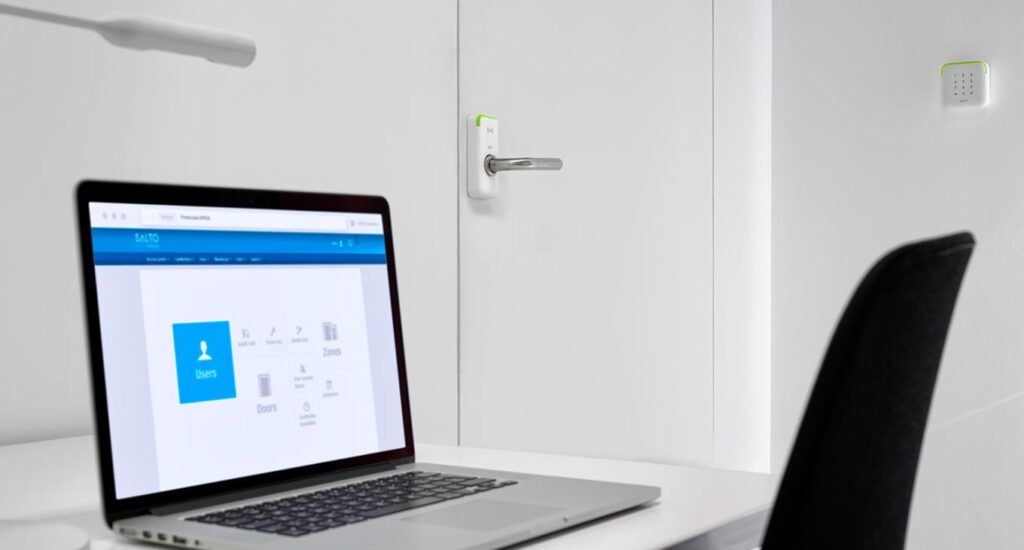How AI is Enhancing Access Control Systems for Smarter Buildings
In the ever-evolving landscape of smart building technology, artificial intelligence (AI) is playing an increasingly pivotal role in transforming access control systems. As buildings become more intelligent, the need for sophisticated, responsive, and adaptive security measures has never been greater. Let’s explore how AI is enhancing access control systems for smart buildings, creating safer and more efficient spaces for businesses and their occupants.
The AI Revolution in Access Control
Access control systems for smart buildings are undergoing a significant transformation, thanks to the integration of AI. These advanced systems are no longer just about granting or denying entry; they’re about creating a seamless, secure, and intelligent environment.
1. Enhanced Security Through Intelligent Analysis
AI-powered access control systems are capable of analysing vast amounts of data in real-time, identifying patterns and anomalies that might escape human observation. This capability allows for:
- Behavioural Analysis: AI algorithms can learn normal access patterns and flag unusual activities, such as attempts to enter restricted areas or access outside of typical hours.
- Predictive Threat Detection: By analysing historical data and current trends, AI can predict potential security risks before they occur, allowing for proactive measures.
2. Seamless Integration with Smart Building Systems
One of the most significant advantages of AI in access control is its ability to integrate with other smart building systems:
- Environmental Controls: AI can adjust lighting, heating, and cooling based on access patterns, optimising energy usage and comfort.
- Occupancy Management: By analysing access data, AI can provide insights into space utilisation, helping to optimise building layouts and resources.
3. Advanced Biometric Authentication
AI has dramatically improved the accuracy and reliability of biometric authentication methods:
- Facial Recognition: Advanced AI algorithms can quickly and accurately identify individuals, even in challenging lighting conditions or with partial face coverage.
- Multi-Factor Biometrics: AI can combine multiple biometric factors, such as facial features and gait analysis, for enhanced security.
4. Adaptive and Learning Systems
Perhaps the most exciting aspect of AI in access control is its ability to learn and adapt:
- Continuous Improvement: AI systems can learn from each interaction, continuously refining their accuracy and effectiveness.
- Dynamic Access Policies: Based on learned patterns and real-time data, AI can adjust access policies automatically, enhancing security without compromising convenience.
The Future of AI in Access Control
As AI technology continues to advance, we can expect even more innovative applications in access control systems for smart buildings:
- Emotion Recognition: Future systems may be able to detect stress or aggression, alerting security personnel to potential issues before they escalate.
- Natural Language Processing: Voice-controlled access and more intuitive management interfaces could become commonplace.
- Autonomous Security Responses: AI could potentially coordinate responses to security breaches, automatically locking down areas or guiding occupants to safety.

Challenges and Considerations
Predictive Maintenance
IoT sensors can monitor the performance of various building systems, including access control hardware. This allows for predictive maintenance, reducing downtime and extending the lifespan of equipment.
Improved Emergency Response
While the benefits of AI in access control are significant, there are important considerations:
- Data Privacy: The collection and analysis of personal data, including biometrics, raise important privacy concerns that must be addressed.
- Cybersecurity: As systems become more connected, ensuring robust protection against cyber threats is crucial.
- Ethical Use: It’s important to establish clear guidelines for the ethical use of AI in security applications.
Conclusion
AI is undoubtedly revolutionising access control systems for smart buildings, offering enhanced security, improved efficiency, and a better user experience. As this technology continues to evolve, it will play an increasingly central role in creating safer, more intelligent, and more responsive building environments.
Opem: Your Partner in Advanced Access Control Solutions
At Opem, we specialise in designing, installing, and maintaining cutting-edge access control and CCTV systems for the commercial property and flexible workspace sector. Our expertise in implementing AI-enhanced security solutions allows us to offer tailored access control systems that meet the unique needs of smart buildings and modern, dynamic work environments.
Our team of skilled professionals understands the intricate requirements of commercial properties and flexible workspaces. We are dedicated to providing state-of-the-art security solutions that enhance both safety and operational efficiency. From initial consultation to system design, installation, and ongoing maintenance, Opem is committed to delivering excellence in integrated security solutions.
By choosing Opem, you’re partnering with a team that stays at the forefront of AI and access control technology. We work closely with industry leaders to ensure that your property benefits from the latest advancements in smart building security, creating a secure, efficient, and future-ready environment for your tenants and visitors.
Contact Opem today to discover how we can transform your commercial property’s security with AI-powered access control solutions, ensuring a safe and productive space for all your occupants.